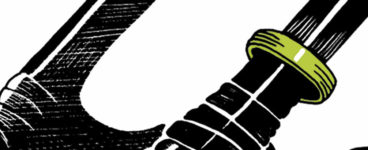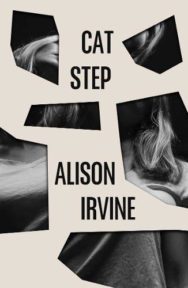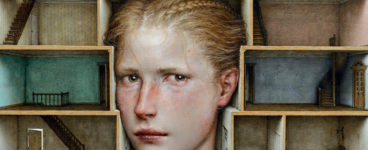‘There was one thing I could have done differently.’
Moving to a new area can often be a lonely, challenging time. In Cat Step, author Alison Irvine explores how a public mistake can make that process even harder. Here is an extract from her honest, clear-sighted novel.
Extract taken from Cat Step
By Alison Irvine
Published by Dead Ink Press
Emily will ask me one day about Lennoxtown. She may discover that she and I lived there briefly when she was on the cusp of four and five and I’ll need to have answers when she asks me why we didn’t stay. I’ll tell her something of the story. She’ll believe me because I’m her mum. By then I may have made sense of her dad.
The truth is Emily and I danced a demi-detourné. We stepped up to Lennoxtown then turned away from it, a half turn, even changing feet so that a new foot was in front. Yet there was no ballerina’s precision or elegance; it was ugly.
Lennoxtown is hard to turn away from, I’ll give it that. Those hills. You catch them as you come round a bend, half submerged in cloud or crossed with sun and shadow or shining with the gold that comes off the grass you get up there. I imagined us climbing them, the Campsie Fells, picnicking, exploring, lying out in good air. But we came in March and winter wasn’t over and it rained and rained and my plans didn’t work out.
There was one thing I could have done differently. My mum said I should leave Emily with her and go alone – have a break, live a little, earn some money if there was any to be earned – and I nearly accepted, I nearly thought it the most sensible of all the options I had. I paused, – en l’air – extension – and then took her with me.
I use ballet terms but I was never a ballerina. I did the training and I almost had the technique, but not the physique or that extra porcelain quality. I was a dancer, a very good dancer: a tapper, a hoofer, a high-kicker. I wore feathers and sequins and American Tan tights and travelled the world on cruise ships. I will tell Emily that.
This is what I won’t tell her: she had been awake between the hours of two and three the night before, crying and thrashing with a temperature and a sore head. I gave her paracetamol and put a cold flannel on her forehead and thought if we ever got back to sleep it would do us good to lie long into the morning. But she woke at six and although she was calmer she was weak and didn’t want anything other than television. In the end she didn’t even want that. I tried to curl up with her on my bed and help her get back to sleep but she wouldn’t settle.
We had nothing in. The bread was gone, the milk was off. She liked fish fingers, and I knew if we drove to the Co-op I could buy some fish fingers and more milk and bread and she might fall asleep on the way home. I knew it would work for her. It always had.
I told her she could wear her dressing gown over her nightie and I’d buy her a treat. I brushed her hair but I didn’t wash her face or clean her teeth. I found her wellies because they were easy to put on and I tied her dressing gown. See how I’m telling it? I had to tell it in this detail many times to many people.
I’d forgotten about the roadworks and the temporary traffic lights and of course by the time the lights turned green Emily was asleep. I wondered if I should drive straight home but I had a queue of cars behind me so I had to go on and once I was through the roadworks I was two minutes from the Co-op and we did need fish fingers and milk and bread and other things I’d remembered like toilet roll and toothpaste. So I made the decision to go on.
I couldn’t get a space close to the entrance so we parked at the back of the car park under the fir trees where the crows had their nests. When I cut the engine I thought the sudden lack of noise might wake her as it often did, but it didn’t. I turned in my seat and checked her. Her lips were parted. Her cheeks were red. She’d kicked off her wellies and peeled her socks from her feet and I could see black hairs on her shins. I thought about carrying her in, but it would have woken her and, God, to wake a sleeping child – an ill child at that – and then drive for hours afterwards trying to get her back to sleep was not an option. I have driven around with her fighting sleep as if it was death closing down on her.
I opened a window to give her an inch of air. I locked the car. I ran to the Co-op. Perhaps I was longer than the few minutes I thought I’d taken. How long does it take to pick up milk, bread, fish fingers and toilet roll? And a slab of chocolate? And cheese and toothpaste. And a Freddo for her treat. I told the woman at the checkout that I didn’t need a bag – and then I changed my mind, so I watched her pack my bag, gave her my Co-op card, paid for my shopping and ran from the shop.
When I came out of the Co-op I saw there were people standing by my car looking towards a running boy. Cap, jeans, red top, that’s all I saw: the sprinting back of him and the flailing soles of his trainers. Something had happened.
‘There was a thief,’ a woman said. ‘He’s run off. We know who he is. Greg’s talking to the police.’ She pointed to a man who was on his phone, pacing. The man looked at me as he spoke and then turned away towards the traffic on Main Street.
I needed to check Emily.
‘He’s a menace,’ the man said, off his phone and making me listen. He pushed his hair back with both hands, shoved his phone into his pocket, adrenalin, urgency all over him.
‘But the car’s not even fancy,’ I said.
‘You left something on your front seat.’
I’d left my phone. I’d put it on the passenger seat to save me carrying it in. The window was smashed but not shattered. Emily was asleep. Fast asleep. She’d slept through it.
‘You can’t leave anything in your car round here,’ the man said. ‘There’s a ring of them. They’ll steal it and sell it on.’
‘At this time of the morning?’ I said, which struck me as an odd thing to say but it was too early to have my car broken into, surely? The sky was weak, the crows were barely awake and the clock on the sandstone church behind us showed only half past eight.
I looked at the people around me. The man and two women, one with a dog on a lead. I checked on Emily again.
She was unhurt. My phone was still on the seat, the window could be fixed. These people had stepped in to help me.
‘Thank you,’ I said.
There was silence. They looked at Emily and then at me.
‘You left her in the car by herself,’ one of the women said. Her dog pulled on its lead and barked at another dog across the car park. She told it to sit and in the same tone of voice said to me, ‘Anything could have happened.’
‘She was asleep,’ I said.
‘That’s even worse.’
I sensed the fullness of her judgement, in increments, like the gradual lightening of the morning.
The other woman spoke. ‘My niece is a social worker. She tells me this is a problem with some parents. You know it’s against the law?’
I unlocked the car and opened the boot and put my shopping down.
‘Please don’t make me feel guilty. She’s not well. She’s been up all night. I know my daughter.’
‘And look at her legs. Look at what you can see. Does she even have underwear on?’ The woman peered through the window at Emily.
I got angry then and when I turned my head I felt the shooting stars I’d been having for days. I told them to get away from the window and of course she had underwear on but when I checked at home, she didn’t. She wasn’t indecent, she was covered, even though her dressing gown had ridden up to her thighs, but they will have used that against me too, that her legs were exposed.
‘I’m taking my daughter home now,’ I said and went to open my door. ‘She’s ill. I know what’s best.’
‘Don’t touch the door!’ the man shouted. ‘That’s the police here now.’ He raised a hand and beckoned the police car to where we stood. ‘You’ll have to stay. They’ll want statements from us. They might be able to get the little shite if they have enough evidence.’
The woman with the dog nodded and told her dog to stay.
Cat Step by Alison Irvine is published by Dead Ink Press, priced £9.99.
ALSO IN THIS ISSUE

 Ka, the Ring and the Raven
Ka, the Ring and the Raven
‘Ka was struck by the elegance of the choughs’ flight, and slightly embarrassed by the efforts he ne …














